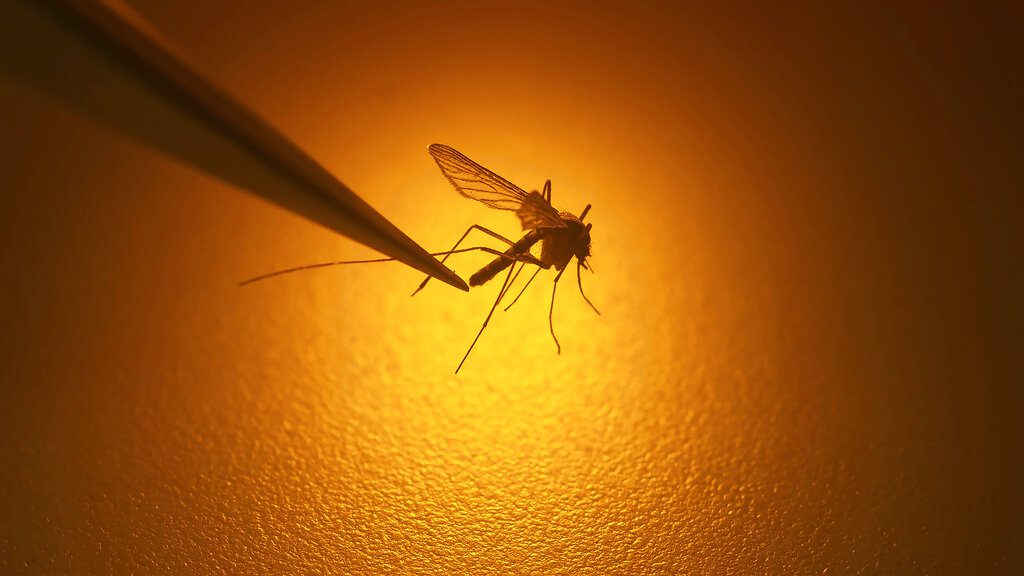
File - In this Aug. 26, 2019, file photo, Salt Lake City Mosquito Abatement District biologist Nadja Reissen examines a mosquito in Salt Lake City. (AP Photo/Rick Bowmer, File)
The current West Nile virus risk in the state is “very high,” according to the Pennsylvania Department of Environmental Protection, with mosquitoes testing positive for the disease in all but 10 of Pennsylvania’s 67 counties.
This story appears in the Keystone newsletter. Subscribe here.
The threat of West Nile virus from mosquitos continues to be a serious issue this summer in Pennsylvania.
The current risk of being infected with West Nile in the state is “very high,” according to the Pennsylvania Department of Environmental Protection’s “Skeeter Meter,” with mosquitoes testing positive for the disease in all but 10 of Pennsylvania’s 67 counties.
Nine cases of West Nile have been confirmed in humans in seven counties: Allegheny, Bucks, Fayette, Lancaster, Lawrence, Philadelphia, and Schuylkill.
Three of those confirmed cases have been reported in Lancaster County.
On Monday, the Allegheny County Health Department announced it had identified the first human case of West Nile virus this year. The ACHD said the Plum Borough resident began experiencing symptoms in mid-July, including fever, malaise, diarrhea, and anorexia. They are currently recovering at home
The Bucks resident infected with West Nile became critically ill and was hospitalized, according to the Allentown Morning Call.
Counties across the state are stepping up mosquito surveillance and control measures, in coordination with the state departments of health, environmental protection, and agriculture. You can find out when and where your county is spraying for mosquitoes here, and residents can submit mosquito complaints to the state DEP using this online form.
Children 5 or younger and adults 65 and older are most at risk for getting sick from West Nile, according to health officials.
According to the Centers for Disease Control and Prevention, between 70 and 80 percent of people who become infected with the virus do not develop symptoms and are not impacted. Approximately 20 percent of those infected will develop a fever with other symptoms such as headache, body aches, joint pains, vomiting, diarrhea, or rash.
Most people with symptoms can recover on their own. Less than one percent of people will develop severe symptoms of neurologic illness caused by inflammation of the brain or spinal cord. Anyone who believes they or someone they know has West Nile virus should consult a health care provider for evaluation and diagnosis.
Officials stress that individuals should do all they can to avoid getting bitten, which means taking steps like using repellent, wearing clothing with long sleeves and long pants, and staying indoors when the mosquitoes are most active, like dusk and dawn.
It’s also important to take precautions around your property. Dumping standing water frequently from buckets, bird baths, ornamental ponds, flowerpots, tarps, toys, etc., is key to preventing mosquito breeding grounds.
Support Our Cause
Thank you for taking the time to read our work. Before you go, we hope you'll consider supporting our values-driven journalism, which has always strived to make clear what's really at stake for Pennsylvanians and our future.
Since day one, our goal here at The Keystone has always been to empower people across the commonwealth with fact-based news and information. We believe that when people are armed with knowledge about what's happening in their local, state, and federal governments—including who is working on their behalf and who is actively trying to block efforts aimed at improving the daily lives of Pennsylvania families—they will be inspired to become civically engaged.


The amount of fentanyl seized in Pennsylvania this year set to surpass last year’s figures
Fentanyl has replaced heroin as the opioid most commonly found in Pennsylvania, state Attorney General Dave Sunday said. Standing alongside various...

1962 Bristol church murder of Carol Ann Dougherty finally solved. DA reveals killer
The murder of Carol Ann Dougherty in a Bristol Borough church, a case that vexed investigators for 63 years and "haunted a community for decades" is...

Lebanon Co. DA investigating Children and Youth Services for allegedly endangering kids
The Lebanon County District Attorney’s Office has announced a formal investigation into the Lebanon County Children and Youth Services, with...

Shooting at a historically Black university’s homecoming fest in Pennsylvania kills 1 and wounds 6
Investigators were operating under a "strong belief" that there was more than one shooter but did not think they came to the Lincoln University...

Bucks County inmate work release program won’t be suspended despite rash of escapes
Bucks County Corrections Department officials have no plans to suspend a work release program in the wake of two additional inmates who failed to...




